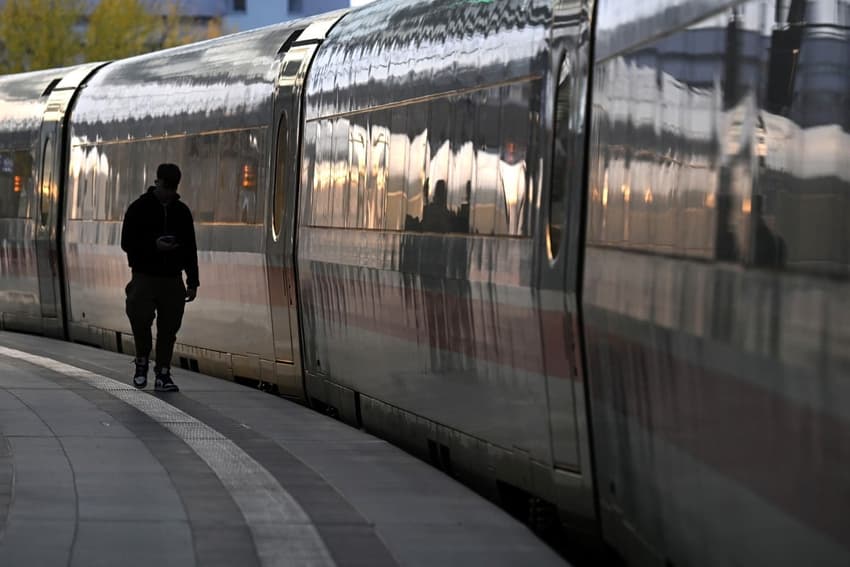Almost every third German rail passenger delayed from January to November 2023

Just under 30 percent of Deutsche Bahn long-distance rail passengers in Germany arrived at their destination late in the first 10 months of 2023 and, unfortunately, the situation doesn't look likely to improve any time soon.
Around 69.6 percent of German train passengers travelling between January and November of this year arrived at their respective destinations on time, Deutsche Bahn (DB) said in response to a question from Green party transport minister Matthias Gastel.
This is virtually the same as the figure for the whole of 2022.
The so-called 'passenger punctuality' rate is different to the 'punctuality statistics', which the rail company publish online each month.
The latter only shows how many trains arrived at their destination at least six minutes after their scheduled arrival time in the respective month.
In November, almost every second long-distance service met this criteria, meaning the train operator is a long way off achieving the 2023 train punctuality target of over 70 percent it set itself.
Passenger punctuality, on the other hand, measures when individual passengers arrived at their destination. It therefore takes train cancellations and replacement transport services into account.
These statistics consider a passenger to be delayed if they reach their destination at least 15 minutes later than the time on the scheduled timetable.
Between 2017 and 2020, DB's passenger punctuality was always over 80 percent, but it's fallen considerably since that time.
The railway only publishes these figures once a year in the annual report of its subsidiary DB Fernverkehr, but Gastel is calling for more regular updates.
“This information says more about the extent to which passengers are affected than just the counting of trains,” he said, calling for a more transparent strategy.
READ ALSO: Will Germany see more rail strikes in 2024?
The railway needs to make sure that more attention is given to trains with high occupancy figures or those with quick connections in its everyday operations, he said.
This lack of reliability is primarily due to the rail network, which has been neglected for decades and is dilapidated, outdated and completely overloaded in many places.
Numerous construction sites are slowing down train traffic nationwide, so the government has pledged many additional billions of euros to fundamentally renovate the existing network in the coming years.
Dozens of heavily polluted corridors are to be tackled by 2030, completely closed for around six months each and renovated.
This work is due to start next summer on the so-called Riedbahn stretch of railway between Frankfurt and Mannheim.
From the New Year onwards, the route will be completely closed for a few weeks in order to carry out preparatory measures for the general renovation in the second half of the year.
Comments
See Also
This is virtually the same as the figure for the whole of 2022.
The so-called 'passenger punctuality' rate is different to the 'punctuality statistics', which the rail company publish online each month.
The latter only shows how many trains arrived at their destination at least six minutes after their scheduled arrival time in the respective month.
In November, almost every second long-distance service met this criteria, meaning the train operator is a long way off achieving the 2023 train punctuality target of over 70 percent it set itself.
Passenger punctuality, on the other hand, measures when individual passengers arrived at their destination. It therefore takes train cancellations and replacement transport services into account.
These statistics consider a passenger to be delayed if they reach their destination at least 15 minutes later than the time on the scheduled timetable.
Between 2017 and 2020, DB's passenger punctuality was always over 80 percent, but it's fallen considerably since that time.
The railway only publishes these figures once a year in the annual report of its subsidiary DB Fernverkehr, but Gastel is calling for more regular updates.
“This information says more about the extent to which passengers are affected than just the counting of trains,” he said, calling for a more transparent strategy.
READ ALSO: Will Germany see more rail strikes in 2024?
The railway needs to make sure that more attention is given to trains with high occupancy figures or those with quick connections in its everyday operations, he said.
This lack of reliability is primarily due to the rail network, which has been neglected for decades and is dilapidated, outdated and completely overloaded in many places.
Numerous construction sites are slowing down train traffic nationwide, so the government has pledged many additional billions of euros to fundamentally renovate the existing network in the coming years.
Dozens of heavily polluted corridors are to be tackled by 2030, completely closed for around six months each and renovated.
This work is due to start next summer on the so-called Riedbahn stretch of railway between Frankfurt and Mannheim.
From the New Year onwards, the route will be completely closed for a few weeks in order to carry out preparatory measures for the general renovation in the second half of the year.
Join the conversation in our comments section below. Share your own views and experience and if you have a question or suggestion for our journalists then email us at [email protected].
Please keep comments civil, constructive and on topic – and make sure to read our terms of use before getting involved.
Please log in here to leave a comment.